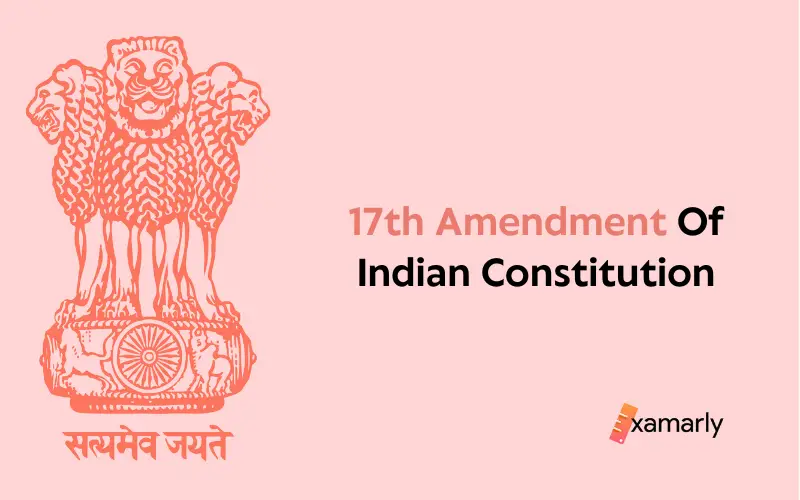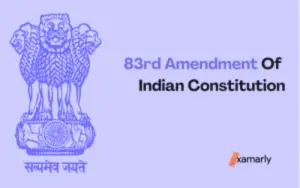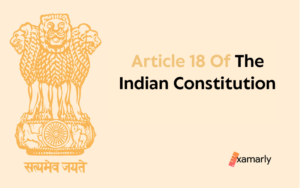THE CONSTITUTION (SEVENTEENTH AMENDMENT) ACT, 1964 is the formal name of India’s 17th Amendment of Indian Constitution. Its primary goal was to include land acquisition legislation in Schedule 9 of the Constitution and ensure the legality of estate acquisition under the Constitution.
Read this article further to learn more about the changes done by the 17th amendment of Indian Constitution. Also, you will understand the reason behind the need for such amendment and much more information. This will be worth reading for you if you are preparing for a competitive examination like UPSC. This is included in the Indian Polity of UPSC Syllabus.
17th Amendment Of Indian Constitution
On 20 June 1964, the seventeenth amendment came into effect. When this amendment was passed, Jawaharlal Nehru was the prime minister. This modification was passed in the Fifteenth Year year of the Republic of India. This constitutional amendment modifies article 31A and schedule 9 of the Indian Constitution.
Amended Article 31A to state that the government must give compensation equal to the market value before acquiring any land used for personal cultivation.
The Ninth Schedule has been modified. In addition, 44 state legislation dealing with land issues were added.
Related – Sajjan Singh vs State Of Rajasthan
Objects And Reasons
According to Article 31A of the Constitution, a law pertaining to the State’s acquisition of an estate or any rights therein, as well as their extinction or modification, shall not be deemed invalid on the ground that it conflicts with, abridges, or restricts any of the rights granted by Articles 14, 19, or 31.
According to Article 31A of the Constitution, a law pertaining to the State’s acquisition of an estate or any rights therein, or the extinction or modification of any such rights, shall not be deemed void on the ground that it is incompatible with, or diminishes, revokes, or interferes with any of the rights granted by Article 14, Article 19, or Article 31.
Only those tenures that were estates on January 26th are eligible for the protection provided by this article. The Constitution went into effect on this day as well.
The term “estate” has been defined variously in several States. In addition, as a result of the transfer of land resulting from the reorganization of States, the term has also come to be defined differently in various regions within the same State.
In various States, “estate” has been defined in a variety of ways. Moreover, the phrase has come to be defined differently in various regions of the same State as a result of the transfer of land from one State to another due to the reorganization of States.
Additionally, many land reform enactments concern lands that are not part of an estate. Numerous State Acts pertaining to land reform were overturned on the grounds that they did not fall under the protection of Article 31A. Furthermore, their content was a violation of Constitutional Articles 14, 19, and 31.
The Constitution’s Article 31A definition of “estate” is consequently being proposed to be changed. This is accomplished by including in it both the lands owned under the Ryotwari Settlement and other lands in respect of which provisions are generally made in land reform enactments.
Additionally, it is proposed to make it clear that in cases where a law calls for the State to acquire an estate, and any area included therein is held by a person who cultivates it personally, it shall not be legal for the State to acquire any such area that is within the ceiling limit applicable to him under any law for the time being in force, as well as any building or structure standing thereon or attached to it.
The Ninth Schedule is also up for modification. This is accomplished by putting in them specific State legislation concerning land reform in order to eliminate any ambiguity or doubt that might emerge regarding their legality.
The Ninth Schedule is also being altered. In order to dispel any confusion or dispute that might emerge regarding their validity, this is accomplished by incorporating therein a number of State enactments pertaining to land reform.
The Bill aims to accomplish these goals.
Important Provisions In 17th Amendment Of Indian Constitution
Amendment of article 31A- Article 31A of the Constitution states that:
(i)After the current proviso in clause (1), the following proviso should be added, specifically:-
“Provided further that where any law makes any constitutional provision for the State to acquire any estate and any area included therein is held by a person engaged in personal cultivation, it shall not be lawful for the State to acquire any portion of such area as is within the ceiling limit applicable to him under any law currently in force or any building or structure standing thereon or appurtenant thereto unless the law governing the purchase of such land, building, or construction provides for payment of compensation at a rate that shall not be less than the market worth thereof.
(ii) The following sub-clause shall be substituted for sub-clause (a) in clause (2) and shall be deemed to have always been substituted, namely:-
(a)The term “estate” shall have the same meaning as that term or its local equivalent has in the applicable law related to land tenures in any local region, and shall also include the following:
(i) any jagir, inam, muafi, or other grant of a like nature, as well as any janmam right in the states of Kerla and Madras;
(ii)every piece of land under Ryotwari village;
(iii) any area owned or leased for agricultural uses or those related thereto, including waste land, forest land, land for pasture, or locations for buildings and other structures occupied by cultivators of land, agricultural labourers, and village artisans;”
Amendment of Ninth Schedule-The following entries will be added to the Constitution’s Ninth Schedule after entry 20:
“21. The Andhra Pradesh Ceiling on Agricultural Holdings Act, 1961 (Andhra Pradesh Act X of 1961).
22. The Andhra Pradesh (Telangana Area) Tenancy and Agricultural Lands (Validation) Act, 1961 (Andhra Pradesh Act XXI of 1961).
23. The Andhra Pradesh (Telangana Area) Ijara and Kowli Land Cancellation of Irregular Pattas and Abolition of Concessional Assessment Act, 1961 (Andhra Pradesh Act XXXVI of 1961).
24. The Assam Sate Acquisition of Lands Belonging to Religious or Charitable Institution of Public Nature Act, 1959 (Assam Act IX of 1961).
25. The Bihar Land Reforms (Amendment) Act, 1953 (Bihar Act XX of 1954).
26. The Bihar Land Reforms (Fixation of Ceiling Area and Acquisition of Surplus Land) Act, 1961 (Bihar Act XII of 1962), (except section 28 of this Act).
27. The Bombay Taluqdari Tenure Abolition (Amendment) Act, 1954 (Bombay Act I of 1955).
28. The Bombay Taluqdari Tenure Abolition (Amendment) Act, 1957 (Bombay Act XVIII of 1958).
29. The Bombay Inams (Kutch Area) Abolition Act, 1958 (Bombay Act XCVIII of 1958).
30. The Bombay Tenancy and Agricultural Lands (Gujarat Amendment) Act, 1960 (Gujarat Act XVI of 1960).
31. The Gujarat Agricultural Lands Ceiling Act, 1960 (Gujarat Act XXVII of 1961).
32. The Sagbara and Mehwassi Estates (Proprietary Rights Abolition, etc.) Regulation, 1962 (Gujarat Regulation I of 1962).
33. The Gujarat Surviving Alienations Abolition Act, 1963 (Gujarat Act XXXIII of 1963), except in so far as this Act relates to an alienation referred to in sub-clause (d) of clause (3) of section 2 thereof.
34. The Maharashtra Agricultural Lands (Ceiling on Holdings) Act, 1961 (Maharashtra Act XXVII of 1961).
35. The Hyderabad Tenancy and Agricultural Lands (Re-enactment, Validation and Further Amendment) Act, 1961 (Maharashtra Act XLV of 1961).
36. The Hyderabad Tenancy and Agricultural Lands Act, 1950 (Hyderabad Act XXI of 1950).
37. The Jenmikaram Payment (Abolition) Act, 1960 (Kerala Act III of 1961).
38. The Kerala Land Tax Act, 1961 (Kerala Act XIII of 1961).
39. The Kerala Land Reforms Act, 1963 (Kerala Act I of 1964).
40. The Madhya Pradesh Land Revenue Code, 1959 (Madhya Pradesh Act XX of 1959).
41. The Madhya Pradesh Ceiling on Agricultural Holdings Act, 1960 (Madhya Pradesh Act XX of 1960).
42. The Madras Cultivating Tenants Protection Act, 1955 (Madras Act XXV of 1955).
43. The Madras Cultivating Tenants (Payment of Fair Rent) Act, 1956 (Madras Act XXIV of 1956).
44. The Madras Occupants of Kudiyiruppu (Protection from Eviction) Act, 1961 (Madras Act XXXVIII of 1961).
45. The Madras Public Trusts (Regulation of Administration of Agricultural Lands) Act, 1961 (Madras Act LVII of 1961).
46. The Madras Land Reforms (Fixation of Ceiling on Land) Act, 1961 (Madras Act LVIII of 1961).
47. The Mysore Tenancy Act, 1952 (Mysore Act XIII of 1952).
48. The Coorg Tenants Act. 1957 (Mysore Act XIV of 1957).
49. The Mysore Village Offices Abolition Act, 1961 (Mysore Act XIV of 1961).
50. The Hyderabad Tenancy and Agricultural Lands (Validation) Act, 1961 (Mysore Act XXXVI of 1961).
51. The Mysore Land Reforms Act, 1961 (Mysore Act X of 1962).
52. The Orissa Land Reforms Act, 1960 (Orissa Act XVI of 1960).
53. The Orissa Merged Territories (Village Offices Abolition) Act, 1963 (Orissa Act X of 1963).
54. The Punjab Security of Land Tenures Act, 1953 (Punjab Act X of 1953).
55. The Rajasthan Tenancy Act, 1955 (Rajasthan Act III of 1955).
56. The Rajasthan Zamindari and Biswedari Abolition Act, 1959 (Rajasthan Act VIII of 1959).
57. The Kumaun and Uttarkhand Zamindari Abolition and Land Reforms Act, 1960 (Uttar Pradesh Act XVII of 1960).
58. The Uttar Pradesh Imposition of Ceilinng on Land Holdings Act, 1960 (Uttar Pradesh Act I of 1961).
59. The West Bengal Estates Acquisition Act, 1953 (West Bengal Act I of 1954).
60. The West Bengal Land Reforms Act, 1955 (West Bengal Act X of 1956).
61. The Delhi Land Reforme Act, 1954 (Delhi Act VIII of 1954).
62. The Delhi Land Holdings (Ceiling) Act, 1960 (Central Act 24 of 1960).
63. The Manipur Land Revenue and Land Reforms Act, 1960 (Central Act 33 of 1960).
64. The Tripura Land Revenue and Land Reforms Act, 1960 (Central Act 43 of 1960).
Explanation.-Any acquisition made under the Rajasthan Tenancy Act, 1955 (Rajasthan Act III of 1955), in contravention of the second proviso to clause (1) of article 31A shall, to the extent of the contravention, be void.”.
Read Also – 66th Amendment Of Indian Constitution
Conclusions
The 17th amendment of Indian constitution went into effect on 20 June 1964. This comprehensive amendment modifies article 31A and schedule 9 of the Indian constitution. This revision prohibited the acquisition of land used for personal agriculture unless a price equal to the property’s market value was paid. In addition, 44 more Acts were added to the ninth schedule.






